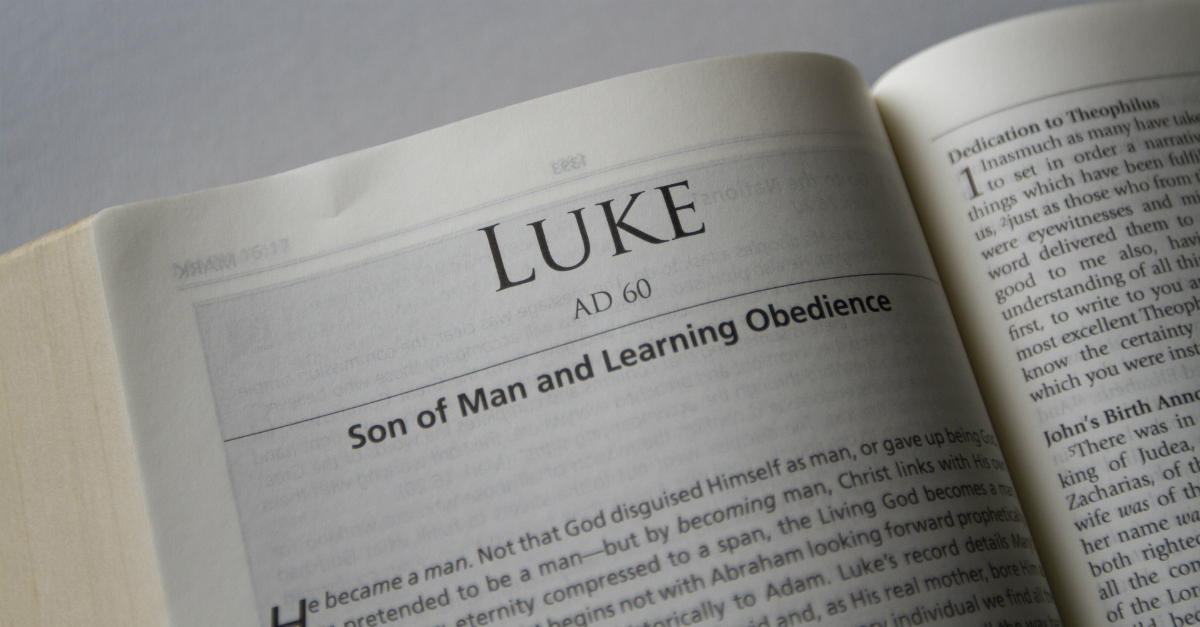Luke Trembath Cause Of Death - An Ancient Story Unfolds
Many people are, you know, often searching for details about the lives of those who have left us, and perhaps, too it's almost, you’re here looking into what happened with Luke Trembath. It's a natural thing, really, to want to grasp the story behind someone's passing, to find some clarity in moments of loss or just plain curiosity. We often look for answers, a bit of understanding, when a name comes up, particularly when it comes to life's final chapters.
As a matter of fact, when we consider accounts of lives, it brings to mind other stories, other narratives that have been passed down through generations. Sometimes, the information we have at hand, you know, points us in a slightly different direction than what we first thought. This particular discussion, for instance, draws its material from a very old text, one that has, in a way, shaped a lot of thought and belief for a very long time.
So, while the initial thought might be about a more recent individual, the writings given to us for this piece actually tell the tale of a figure from long ago, a person named Luke who played a truly significant role in sharing stories that were, apparently, considered deeply important and true by many. It's a look at how certain accounts came to be written down, just how they were put together, and what they aimed to convey to people then and now.
Table of Contents
- A Look at Luke - The Ancient Author
- Who Was This Luke?
- What Did Luke Set Out to Write?
- How Does Luke's Work Connect to Life's Challenges?
- Why Is Luke's Account Still Relevant Today?
- What Themes Did Luke Emphasize for Disciples?
- Exploring the Gospel's Scope
- The Gospel of Luke - A Deep Look at Jesus's Story
- The Trustworthiness of Luke's Work
A Look at Luke - The Ancient Author
Many people, it seems, have taken on the task of putting together a record of events that, apparently, came to pass among us, just as they were, you know, given to us by those who saw them firsthand right from the start. This Luke, the one known as an evangelist, was one of four such writers, those traditionally given credit for the books that tell the story of Jesus. The early church leaders, actually, gave him credit for writing both the gospel and another book that follows it. He was, in a way, a careful chronicler, someone who sought to capture these important happenings for others to know.
He was not, it seems, going to write about things where people who followed Jesus might have, perhaps, different views or feel a bit uncertain within themselves. No, his focus was on those matters that are, and really ought to be, surely believed by everyone. This approach shows a very clear intention, a desire to provide a solid foundation for faith, so to speak. He was, basically, aiming for clarity and certainty in his account, making sure the core messages were unmistakable.
Who Was This Luke?
The Luke we are discussing, the evangelist, was someone whose writings were highly valued, and still are, in many circles. He is traditionally understood to be the person who penned one of the four main accounts of Jesus's life. His work, as a matter of fact, is seen as a personal and original piece, coming from someone who was, essentially, a witness to the faith held by the early community of followers. His primary desire, it seems, was to lay out the deep meaning of Christ for us, showing how Christ brought God's plan to its full completion.
While the provided text doesn't offer many personal details about Luke the Evangelist, we can gather a few things about his role and what he was known for:
| Detail | Description |
|---|---|
| Role | One of the four traditionally recognized evangelists. |
| Authorship | Credited with writing the Gospel of Luke and the book of Acts. |
| Source of Information | Relied on accounts handed down by eyewitnesses from the very beginning. |
| Purpose of Writing | To set forth a declaration of things most surely believed; to present the mystery of Christ. |
| Focus | Emphasized Jesus's care for the poor, lowly, outcast, sinner, and afflicted. |
| Quality of Work | Modern research has, apparently, confirmed the quality of his careful work. |
What Did Luke Set Out to Write?
Luke's writing project, you know, wasn't just a random collection of stories. He had a very specific goal in mind. He aimed to "set forth in order a declaration of those things which are most surely believed among us." This means he was compiling an organized account of what the early followers of Jesus held to be true, things that were, quite frankly, central to their beliefs. It was, in a way, a foundational document, meant to solidify what people understood about Jesus and his message.
He wasn't, perhaps, interested in simply repeating what others had already said without careful consideration. Instead, he was drawing from accounts that were "delivered unto us, which from the beginning" were considered reliable. This suggests a careful approach, a desire to present a trustworthy narrative. It’s almost like he was saying, "Here are the things we really stand by, the core truths as they were given to us."
How Does Luke's Work Connect to Life's Challenges?
Interestingly, Luke's writings touch upon very human experiences, including dealing with hardship and the need for persistence, topics that can, you know, sometimes feel connected to understanding the deeper "cause" of things in life, even facing difficult moments. For example, Luke 18 shares the story of the persistent widow. Jesus, apparently, told them this story about their constant need to pray and not lose heart, even when things seem tough. It speaks to a deep human need for resilience, for keeping on even when the path is, perhaps, a bit unclear.
The parable describes a judge in a certain town who, basically, neither feared anyone nor cared for others. This judge's character sets the stage for a lesson about unwavering faith and the power of consistent appeal. It's a story that, in a way, encourages us to keep going, to not give up hope, even when faced with what seems like an unresponsive world. This message of perseverance, of sticking with it, is something that, you know, can really speak to anyone facing life's various difficulties, whatever their "cause" might be.
Why Is Luke's Account Still Relevant Today?
Even though it was written so long ago, the book of Luke is, apparently, still widely read and studied. You can find it online, which is pretty neat, actually, considering how old it is. It comes with scripture chapters, verses, and often full summaries, along with commentary and meaning, and even concordances for deeper study. This continued accessibility and the resources available for understanding it show just how much people still value its contents. It's not just a historical document; it's a living text for many.
The fact that it's so readily available and continues to be explored for its meaning suggests that its messages, you know, still resonate. People are still looking for guidance, for stories that offer insight into life's big questions, and Luke's account, it seems, provides that for a great many. It's a testament to the enduring nature of the stories and teachings it contains, basically, showing how certain truths can stand the test of time.
What Themes Did Luke Emphasize for Disciples?
Throughout his gospel, Luke, in a way, often calls upon those who follow Jesus to see themselves in the master, Jesus, who is depicted as truly caring and gentle toward the poor and the lowly. He shows a deep concern for the outcast, the sinner, and the afflicted. This emphasis on compassion is, you know, a very central "cause" in Luke's writing, highlighting Jesus's embrace of those often overlooked or marginalized by society. It’s a powerful message about inclusion and empathy.
This focus is, perhaps, a key part of what makes Luke's account so impactful for many. It paints a picture of a compassionate leader, someone who reaches out to those in need, offering comfort and acceptance. This particular aspect of Jesus's character, as portrayed by Luke, really speaks to the heart of what it means to care for others, and it's a message that, actually, continues to inspire people to act with kindness and understanding in their own communities.
Exploring the Gospel's Scope
Luke's gospel is, apparently, one of the larger books within the New Testament, stretching over 24 chapters. It covers, basically, five main themes, giving a broad picture of Jesus's life and impact. It starts by saying, "Forasmuch as many have taken in hand to set forth in order a declaration of those things which are most surely believed among us," which just goes to show the intention to provide a comprehensive and organized account of these foundational beliefs. It's a detailed narrative, very much put together with a purpose.
The gospel, in a way, continues by noting that these things were "delivered them unto us, which from the beginning" were known. This reinforces the idea of a tradition, a handing down of important information from those who were there. It's like a careful collection of eyewitness testimonies and trusted accounts, all woven together to form a cohesive story. This commitment to detail and order is, you know, a hallmark of Luke's work.
The Gospel of Luke - A Deep Look at Jesus's Story
The Gospel of Luke is, essentially, the third account of Jesus Christ's story, as it's usually listed in the New Testament. It tells, you know, about Jesus's beginnings, his birth, his time of public service, his passing, his coming back to life, and his going up to heaven. This comprehensive narrative, along with the book of Acts, provides a full picture of Jesus's journey and the early days of his followers. It's a truly sweeping account, covering a vast period of significant events.
It includes, for example, a footnote about Luke 7:41, explaining that a denarius was the usual daily wage for a day laborer. This little detail, actually, gives us a glimpse into the everyday life and economy of the time, making the stories feel, perhaps, a bit more grounded and real. The gospel is, ultimately, a foundational text for many, providing a detailed narrative of events that are, basically, considered central to their faith.
The Trustworthiness of Luke's Work
When we look at Luke's writings, it's pretty interesting to note that modern research has, apparently, confirmed the quality of his careful work. This means that scholars, using various methods, have found his accounts to be, you know, quite reliable. This validation speaks to the diligence and accuracy with which Luke approached his
- Recommended Whitening Strips
- Salma Hayek Bikini
- Nelly Arrested
- Kevin Kimmel
- Mary Kay Letourneau Children

The Gospel of Luke | Verse By Verse Ministry International

Book of Luke Summary | Christianity.com

Luke Skywalker | Lukepedia | FANDOM powered by Wikia